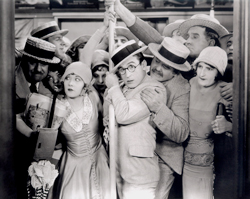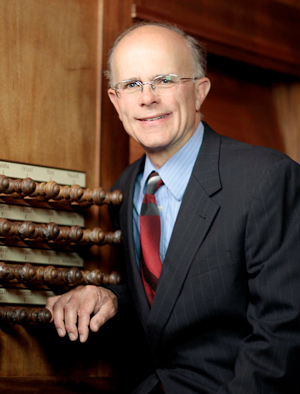by Robert Rollin

Wilson, head of the Organ Department at the Cleveland Institute of Music and Director of Music and Worship at Cleveland’s Trinity Episcopal Cathedral, has helped revive this venerable tradition. He started doing it at University Circle’s Church of the Covenant Summer Series as a means of drawing in crowds for pure entertainment and enjoyment, and the reactions eventually turned this pursuit into nationwide tour performances.
Wilson began with a short preamble extolling Stambaugh’s E.M. Skinner organ as “one of the greatest in the US,” and then praised Harold Lloyd as a “genius in his own way.” Lloyd not only possessed the talents of an acrobat, he also had an innate and masterful sense of comedic timing which caused Speedy, an eighty-six-minute full-length movie, to fly by as if it was only thirty minutes long. Wilson’s accompaniment had lovely dynamic shading, delicious quotations of New York- and baseball-related songs, and impeccable timing that seamlessly joined his performance to the film. (The need for the baseball songs stems from Speedy’s love of baseball and a cameo by Babe Ruth.)
The simple plot has Speedy, a ne’er-do-well, good natured young man who has trouble holding on to a job, in love with Jane, daughter of Pop Dillon, driver of the last horse-drawn streetcar in New York. The wonderful New York locations include a candy store where Speedy is a soda jerk, a hilarious Coney-Island date in the amazing but now defunct Luna Park, a horribly-crowded rush hour subway car in which Speedy/Lloyd uses his acrobatic skills to get his girlfriend a seat, the neighborhood near the Brooklyn Bridge, the unique locale of the Flatiron building, Times Square, and many other downtown Manhattan places.
A shady mechanical streetcar magnate tries to buy Pops’s vehicle and route, but Speedy changes Pops’s price quote from ten to seventy thousand dollars. The enraged streetcar man sets a host of his evil henchmen after Speedy and the horse-drawn car.
Speedy finds out that a planned merger of all streetcar services cannot take place without the buyouts of the smaller franchises. Speedy, helped by Pop’s aging friends and a stray dog that followed him home from Coney Island, defeats the scoundrels in a series of fast-paced imbroglios that send the movie rushing headlong to its slapstick conclusion. The greedy streetcar man pays Pops one hundred thousand dollars for his business—a huge sum in the 1920’s.
Throughout all the fast changes and nuances of plot, Wilson stayed faithful to the comedic film. In support of his deft performance that seemingly had the music glued to events on the screen, Wilson also used the quotation of well-known songs so characteristic of Silent Era improvised and composed scores. These included
The Sidewalks of New York, Take Me Out to the Ball Game, Lullaby and Goodnight (Brahms’ Lullaby), and I’ve Got Plenty of Nothin’ (from Gershwin’s Porgy and Bess).
That the audience was absolutely delighted with the show is a tribute to Wilson’s prodigious skills as organist and improviser.
Photo of Todd Wilson at the Trinity Cathedral organ by Sam Hubish.
Published on ClevelandClassical.com October 22, 2014.
Click here for a printable copy of this article



